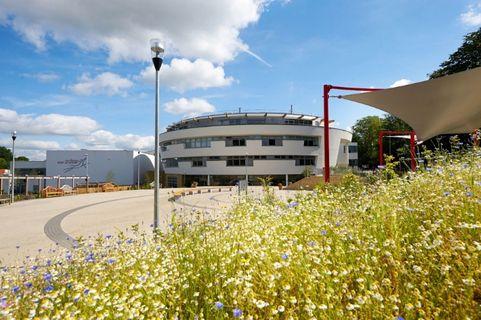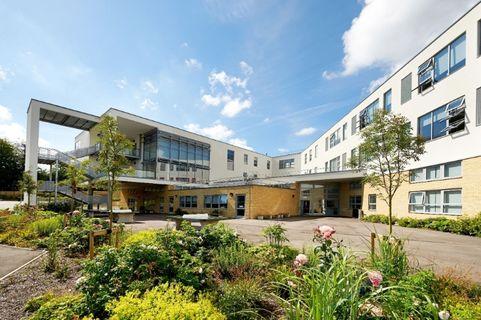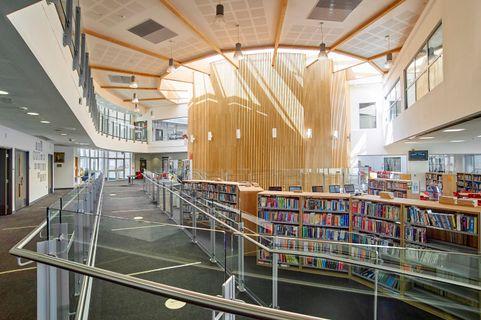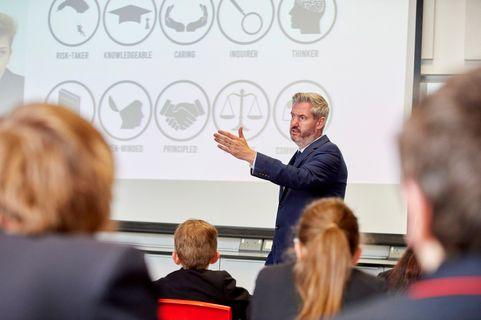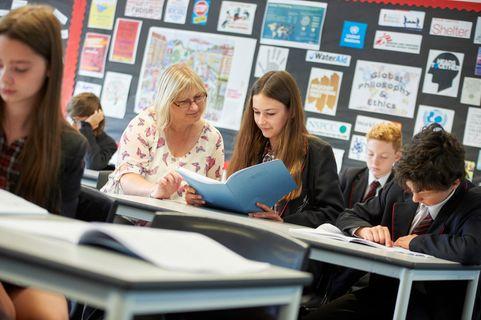Director of Learning - Humanities Faculty
The Skinners' Kent Academy
Tunbridge Wells, Kent
- Expired
- Salary:
- Leadership L10 - L13 - £51,310 - £55,201 (scale dependent on experience)
- Job type:
- Full Time, Permanent
- Start date:
- September 2020
- Apply by:
- 27 March 2020
Job overview
DIRECTOR OF LEARNING -HUMANITIES FACULTY
Owing to exciting developments and continued growth an exciting opportunity has arisen for colleagues who are seeking the next steps towards Senior Leadership. Alongside overseeing the strategic direction of the Faculty the director of Learning will work closely with core SLT members to gain an understanding and help shape the Academies core business. The areas include: Teaching & Learning; Teacher Development; Systems and Operations; Curriculum; Data and Assessment. We welcome applications from all subjects within this Faculty.
The Faculty of Humanities consists of the departments of History, Geography, Religious Studies and Global Philosophy and Ethics.
The Faculty is a dedicated and dynamic team, who are committed to achieving the best outcome for our students. Housed in their own wing of the Academy, excellent facilities support the desire to drive not only each subject individually but also to facilitate a better understanding of our students’ ability to make links across the subjects.
Faculty leads work collaboratively supporting the work of the SLT and Academy staff to ensure all students achieve their best, enjoy their school years and have pride in their success. The successful candidate will lead the strategic vision of the Faculty, ensuring the curriculum and student experience prepares our students for their next steps, supporting the development of staff within the Faculty and ensuring excellent progress from all.
History
History is offered to all students at Key Stage 3, Key Stage 4 (AQA specification) and Key Stage 5 as part of the International Baccalaureate Careers Related Programme (IBCP). The ambitious History curriculum seeks to enrich student experience through the offer of international trips to Berlin and Krakow to learn more about World War Two and the Cold War. The department also run trips to the GCSE site study (Elizabethan England) and have taken students to Hardwick Hall and the Globe Theatre.
History plays an integral role in the delivery of the International Baccalaureate Middle Years Programme (Years 7-9) which puts developing the student as a global citizen in an ever-changing world at the heart of learning. Students are taught an exciting curriculum which focuses on developing the knowledge and skills to support the AQA GCSE History syllabus. This focuses on Elizabethan England 1569-1603, Germany 1890-1945, Health 1000-present day and Conflict and tension (the Cold War) 1945-1972. The International Baccalaureate Learner Profile is threaded through the curriculum and seeks to develop learners as: knowledgeable, reflective, thinkers, caring, inquirers, open-minded, communicators, balanced, risk takers and principled.
Geography
Geography is offered to all students at Key Stage 3, Key Stage 4 (Edexcel B specification) and at Key Stage 5, as part of the International Baccalaureate Careers Related Programme (IBCP). Geography plays an integral role in the delivery of the International Baccalaureate Middle Years Programme (Years 7-9) which puts developing the student as a global citizen in an ever-changing world at the heart of learning. Students are taught an exciting curriculum which focuses on developing knowledge of human and physical Geography as well as develop key foundational skills which will help them succeed at GCSE.
Religious Studies
Religious Studies is offered to all students across all key stages. In Key Stage 4 students can opt to take Religious Studies GCSE (AQA option A 8062 specification). Religious Studies plays an integral role in the delivery of the International Baccalaureate Middle Years Programme (Years 7-9) which puts developing the student as a global citizen in an ever-changing world at the heart of learning. Students are taught an exciting curriculum which focuses on developing knowledge of the main world religions whilst developing more reflective skills by considering moral issues and developments in philosophical and human thinking and behaviour. Alongside these important areas are the means to which we develop key foundational skills which will help them succeed at GCSE level and beyond.
Global Philosophy and Ethics
Global Philosophy and Ethics (GPE) is offered to all students from Year 7-10 (one lesson per week in Year 7 and 8 and one lesson a fortnight in Year 9 and 10). It is an exciting and ambitious curriculum through lessons which support and guide students in learning about Personal, Social, Health and Economic Education (PSHE) as well as becoming moral and principled individuals as part of the Middle Years Programme.
The International Baccalaureate Learner Profile is threaded through the curriculum and seeks to develop learners as knowledgeable, reflective, thinkers, caring, inquirers, open-minded, communicators, balanced, risk takers and principled. Students explore:
- the importance of values and diverse communities; sex education; • personal finance; • careers; • mental health and wellbeing; • online safety; and • ethical dilemmas and issues.
We are continually reviewing our curriculum to ensure it is up to date and will equip students for life in the everchanging 21st Century.
Post-16 Humanities Teaching
Uptake in Humanities subjects continues to be incredibly popular option for our Sixth Form students. The Humanities Faculty currently offers:
• IB History; • IB Geography; • IB Socio-Cultural Anthropology; • Applied Psychology; and • Applied Health and Social Care.
Social and Cultural Anthropology
Social and Cultural Anthropology (SCA) plays an integral role in the delivery of the ethos of the International Baccalaureate. We believe that through studying the subject, the students broaden their outlook on the world around them and as a consequence become more tolerant and understanding of different cultures. As well as studying anthropological theories, students study a number of ethnographies in detail which they use as the basis for their understanding of the course. Students also complete an Internal Assessment which involves anthropological fieldwork on an issue of their choice.
Psychology
BTEC Applied Psychology is offered to all students at Key Stage 5 as part of the International Baccalaureate Careers Related Programme (IBCP). Psychology is a popular subject choice at Year 12 and many students are interested in pursuing further education opportunities in this discipline. Students have seven lessons per fortnight in which they learn about Psychological Approaches and their application to gender, aggression and consumer behaviour as well as Research Methods. In Year 13 students study Health Psychology and an optional unit which is Psychopathology. Both Research Methods and Psychopathology are internally assessed.
Health and Social Care
Pearson BTEC Level 3 National Extended Certificate in Health and Social Care (HSC) is offered to all students at Key Stage 5 as part of the International Baccalaureate Careers Related Programme (IBCP). Students have seven lessons per fortnight to study Health and Social Care and the opportunity to engage in work place learning.
In Year 12, they complete units on Working in Supporting Individuals with Additional Needs and Human Lifespan Development. In Year 13, students learn about Working in Health and Social Care and Meeting Individual Care and Support Needs. Both Working in Supporting Individuals with Additional Needs and Meeting Individual Care and Support Needs are internally assessed.
Attached documents
About The Skinners' Kent Academy
The Skinners’ Kent Academy is a co-educational, non-denominational secondary school for children aged 11-18 with around 1,100 students currently on its role. Located in Tunbridge Wells, the Academy is a non-selective school in a local authority that operates a selective system.
The Academy is part of the Skinners' Academies Trust who are supported by The Skinners’ Company, one of the 12 great livery companies in the City of London.
Principal
Miss Hannah Knowles
Values and vision
The Academy is founded on principles of high standards and high aspirations. It aims to be a emotionally enriching place with a culture of active participation.
Teachers seek to create, develop and maintain an education that provides opportunities for success for all. The Skinners’ Kent Academy aims to celebrate the achievement of everyone, in all aspects of life.
Ofsted report
“The school motto of ‘pride in our success’ permeates through how pupils conduct themselves around the school. They strive to become well-rounded and respectful members of society. Pupils show kindness and consideration to each other because they want everyone to feel included. A strong pastoral provision in every key stage means that pupils feel well supported and have someone to go to if they need help. Should bullying happen, pupils know that staff will help them resolve issues quickly. Relationships between staff and pupils are nurturing and positive. This means that pupils feel safe and well looked after.
Please note that you are wholly responsible for fact checking in respect of the information provided by schools. Please also check for the latest visa and work permit requirements that may apply. Tes is not responsible for the content of advertisements or the policies adopted by advertising schools. Tes asks that all schools follow Tes' Fair Recruitment Policy.


